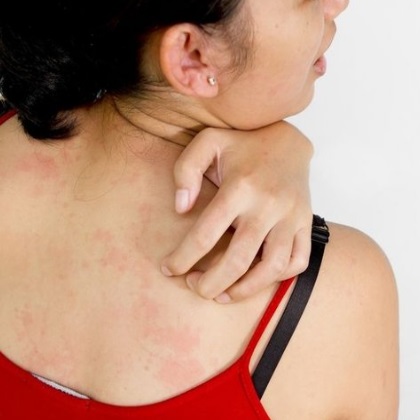Skin
02 Aug 2018
เปิดอ่าน 66273 ครั้ง
One of the most problematic diseases that affect both women and men of all ages, young and adult is dermatological diseases. The most irritable symptom is itching. Itching is an unpleasant sensation, felt on the skin, and the main reason why patients seek medical help. Statistics have shown that 10-50% of the patients who experience itching have other primary diseases such as renal disease, liver disease, or diabetes. Thus it is important to pose many questions so that we can differentiate and analyse the root of the dermatological disease.
Time and temperature play an important role. People experience itching at night more than during the day.
The reason why people experience itching at night more than during the day is because the stimulation of our nervous system increases at night. Consequently, the blood vessels in our body dilate, which stimulates itching. On the other hand, during the day when the temperature is higher, the hypothalamus, which is the centre of regulating our body temperature, is able to suppress the itching sensation. However, when the environmental temperature drops, the hypothalamus is unable to suppress the sensation as much. Statistics reveal that 10% of the patients experience itching at night.
Reasons to itching sensation
Environmental allergy: is caused by the exposure to allergens such as dust, chemicals, animal fur or feathers, bugs, plants, or change in temperature.
Dermatological diseases: itching is usually associated with an underlying dermatological disease and will appear concurrently with rashes. Examples of common skin rashes are dermatitis, psoriasis, tinea corporis, rosacea, herpes zoster, or intertrigo.
Secondary symptoms from other internal diseases: Itching could be a result of other primary diseases such as thyroid imbalance, impairment of liver and/or renal function, a symptom of hematological or oncological diseases.
Impairment of nervous system: inflammation of the nervous system can cause overstimulation of nerves leading to excessive itching. Examples of diseases that fall in this category are herpes simplex and herpes zoster.
Other reasons: the etiology of itching can sometimes come from associated psychological issues.
According to Traditional Chinese Medicine, itching sensation is caused by the pathological invasion of wind, imbalance circulation of blood, deficiency of liver, kidney, and lung. The most important treatment principle is to treat blood in order to treat wind.
WIND:
Wind cold: itching stimulated by cold weather leading to dry skin, the rash will appear white with a light red texture. The treatment principle is to move and nourish blood and warm the meridians.
Wind heat: the rashes tend to appear in color concurrent with red borders. The treatment principle is to move blood and clear heat.
Wind damp: rashes are triggered by humid environments, appearing pink red with white borders. The treatment principle is to clear damp and move blood.
HEAT IN BLOOD: most of the rashes will occur on the same location repetitively, increasing the size of the rash. The borders are usually prominent and the rash is not flat. Fever is usually associated with this syndrome.
DEFICIENCY OF LIVER AND KIDNEY: skin conditions that are more than 1-2 months are considered chronic. Chronic conditions are associated with liver and kidney deficiency, the main organs that circulate and produce blood.
LUNG HEAT or DEFICIENCY OF LUNG: in TCM, the health of the skin is associated to the lung organ. If the lung is deficient or excess, the pathology will appear on the skin. Allergic reactions are usually associated with lung qi deficiency. Itching sensation occurring at a later stage in life is indicative of lung and kidney deficiency. Skin pathologies with heat signs are associated with lung heat; triggers to this kind of skin disorders include smoking. It is important that deficient patients take extra care in their health because itching usually occurs at night, leading to less sleep and fatigue.
MAIN ETIOLOGY TO SKIN DISORDERS SUCH AS HERPES ZOSTER, HERPES SIMPLEX are stress, insufficient sleep, and decreased immunity. Improvement of symptoms and signs are guaranteed within 7 days with herbs and acupuncture.
Skin Disorders and Diet
Contraindications to patients with skin disorders
Seafood such as squid, shrimp, lobster, crab
Nuts such as peanuts, treenuts. Beans are not contraindicated.
Preserved foods such as pickles, preserved fruits, kimchi
Heavily spiced foods such as too spicy, salty, sweet, or sour
Game such as duck, chicken, goose
Alcoholic drinks such as wine, beer
Others: asparagus, beef, sticky rice
Fruits in the same family as jackfruit, durian
Noodles especially when eaten with soups that are broiled with shrimp head, dried squid
Suggested foods
Coconut oil + garlic
Plenty of fluids
Unrefined rice such as brown rice that helps decrease inflammation
Raw papaya
Fresh vegetables and fruits that are cool in temperature such as cucumber, turnip, boiled beans with white wood ear mushroom. Beverages that are cool in temperature are tiger herbal drink, bamboo grass or ya nang drink, chrysanthemum, green bean soup. Sugar is not suggested to be added.
Fresh and organic foods are preferred
Easily digestible foods
Seaweed
Our herbal formulas
Qu Tan Jiao Nang: expel damp, dissolve phlegm, clear heat
Indication: phlegm accumulation, allergies, dermatitis, asthma
Ingredients: Luo Han Guo, Gan Cao, Sea holly, Chameleon plant
Niu Huang Shen Dan: clear heat, move blood
Indication: Balance yin and yang
Ingredients: Niu Huang, Tan Xiang, Tian Zhu Huang
Pai Du Shen Dan: clear toxins, clear heat through bowel movement
Indication: internal heat with constipation
Ingredients: Tian Men Dong, Rou Cong Rong, Luo Han Guo, Fan Xie Ye
